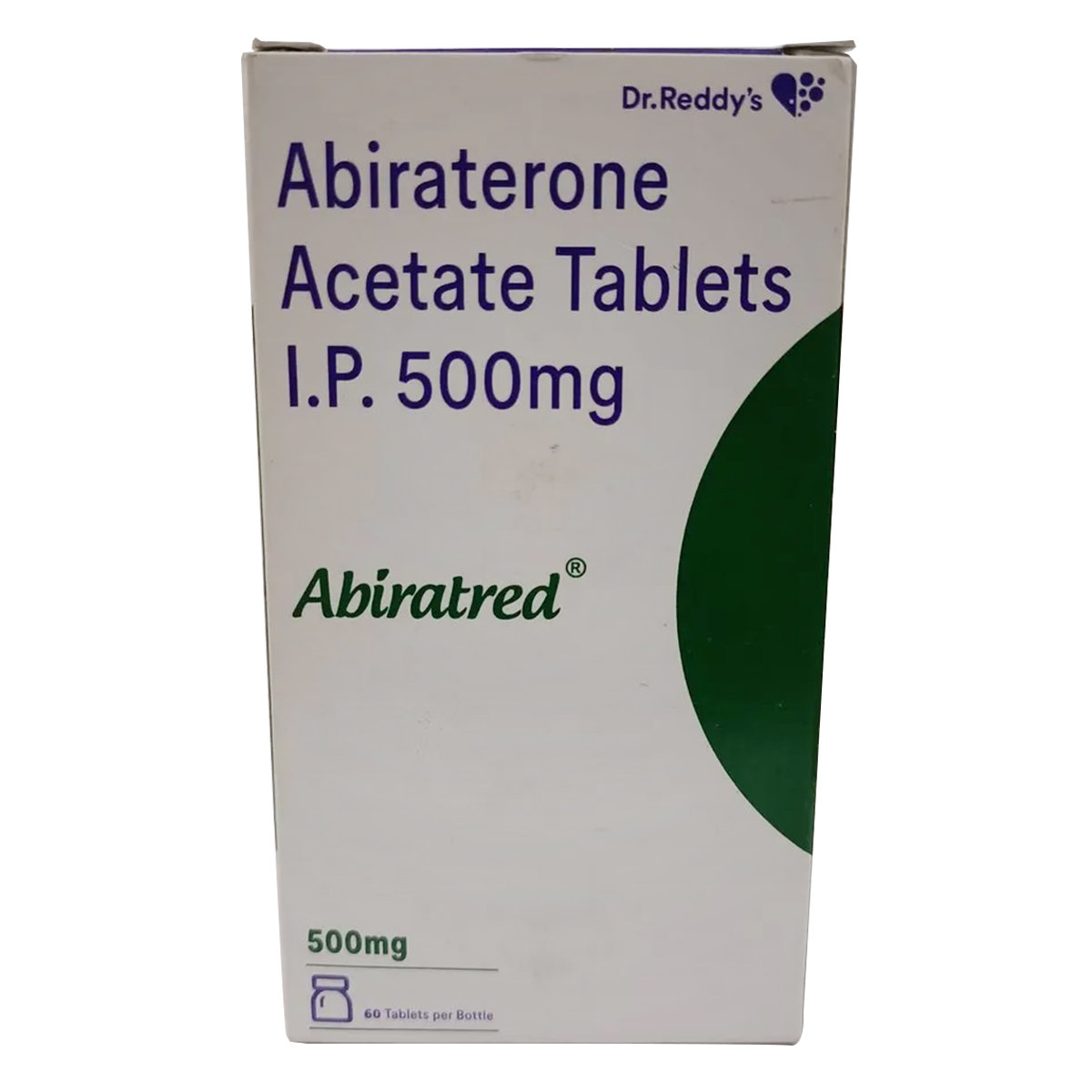Abiraterone
About Abiraterone
Abiraterone belongs to the group of medicines called androgen biosynthesis inhibitors that is indicated in combination with prednisone or prednisolone to treat prostate cancer in adult men that have spread to other body parts.
Abiraterone contains ‘Abiraterone’ that works by stopping the body from making testosterone, thereby slowing the growth of prostate cancer.
In some cases, Abiraterone may cause common side effects such as diarrhoea, urinary tract infection, high blood pressure, low blood potassium, and oedema. If any of the side effects persist or worsen, consult your doctor.
Abiraterone is not for use in women, children, and adolescents. Abiraterone should not be given in combination with Ra-233 (a radioactive isotope used to treat prostate cancer) due to the increased risk of bone fracture or death. Inform your doctor about your health condition and medications to rule out any side effects/interactions.
Uses of Abiraterone
Medicinal Benefits
Abiraterone belongs to the group of medicines called androgen biosynthesis inhibitors, indicated in combination with prednisone or prednisolone to treat prostate cancer in adult men that have spread to other body parts. Abiraterone contains ‘Abiraterone’ that works by stopping the body from making testosterone, thereby slowing the growth of prostate cancer. It is indicated in patients with metastatic castration-resistant prostate cancer (CRPC) who have received prior chemotherapy containing docetaxel and metastatic high-risk castration-sensitive prostate cancer (CSPC). Abiraterone is prescribed in the early stages of the disease, where it is still responding to hormone therapy. It is used with androgen deprivation therapy (a treatment that lowers testosterone).
Directions for Use
Storage
Side Effects of Abiraterone
- Diarrhoea
- Low blood potassium
- High blood pressure
- Urinary tract infection
- Oedema (fluid in legs or feet)
Drug Warnings
Do not take Abiraterone if you are allergic to any of its components, if you have severe liver damage, or in combination with Ra-233 (used to treat prostate cancer). Inform your doctor if you have liver problems, high blood pressure, low blood potassium, heart failure, heart or blood vessel problems, irregular or rapid heartbeat, heart rhythm problems, shortness of breath, rapid weight gain, swelling in the legs, ankles, or feet, high blood sugar, bone problems, or if you have taken ketoconazole in the past for prostate cancer. Abiraterone may cause libido (decreased sex drive), muscle weakness, decreased red blood cells, and/or muscle pain. Abiraterone should not be given in combination with Ra-233 due to an increased risk of bone fracture or death.
Drug Interactions
Drug-Drug Interactions: Inform your doctor if you are taking drugs used to treat heart rhythm problems (quinidine, procainamide, amiodarone, sotalol), pain killer (methadone), antibiotic (moxifloxacin), herbal medicine (St. John’s wort) and antipsychotics.
Drug-Food Interactions: Avoid taking Abiraterone with food as it may cause side effects. Take Abiraterone on an empty stomach, i.e., 1 hour before or 2 hours after food.
Drug-Disease Interactions: Inform your doctor if you have severe liver damage, low blood potassium, heart or blood vessel condition, or arrhythmia (heart rhythm problems).
Drug-Drug Interactions Checker List:
Safety Advice

Alcohol
consult your doctorIt is unknown if alcohol affects Abiraterone. Please consult your doctor.

Pregnancy
unsafeAbiraterone is not for use in women.

Breast Feeding
not applicableAbiraterone is not for use in women.

Driving
safe if prescribedAbiraterone is not likely to affect your ability to drive or operate machinery.

Liver
cautionDo not take Abiraterone if you have severe liver damage. Please consult your doctor if you have a liver impairment or any concerns.

Kidney
consult your doctorPlease consult your doctor if you have kidney impairment or any concerns.

Children
not applicableAbiraterone is not for use in children and adolescents.
Habit Forming
Diet & Lifestyle Advise
- Eat a healthy diet and exercise regularly to maintain proper weight.
- Avoid smoking and alcohol consumption.
- Avoid fast, fried, processed meats, refined carbs, and added sugar.
- Get optimal sleep; rest well.
Special Advise
- Abiraterone may affect the liver. Therefore your doctor may advise regular blood tests to check for any effects on the liver.
- Tell your doctor if you experience darkening of the urine, yellowing of the skin or eyes, or severe vomiting or nausea, as these could be signs of liver problems.
- Abiraterone may cause low blood potassium. Stop taking Abiraterone and consult a doctor immediately if you experience muscle twitches, muscle weakness, or palpitations (pounding heartbeat).
- Use a condom or effective birth control method if you are having sex with pregnant women or women who can become pregnant.
Patients Concern
Disease/Condition Glossary
Prostate cancer: Prostate cancer, also called prostatic carcinoma, is cancer in the prostate gland (a gland that produces seminal fluid). Symptoms include difficulty with urination, weak or interrupted flow of urine, trouble emptying the bladder completely, and pain or burning during urination.
FAQs
Abiraterone works by stopping the body from making testosterone, thereby slowing the growth of prostate cancer.
Prednisolone/prednisone is prescribed along with Abiraterone to lower the chances of getting high blood pressure, fluid retention (having too much water in the body), or low blood potassium levels.
Abiraterone should not be given along with Ra-233 (a radioactive isotope used to treat prostate cancer) due to the increased risk of bone fracture or death. If you are prescribed to take Ra-233 following treatment with Abiraterone and prednisolone/prednisone, you must wait five days before starting treatment with Ra-233.




